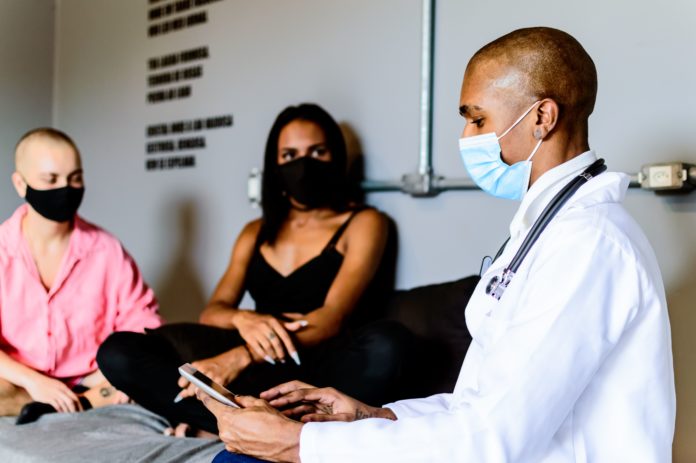/GettyImages-1310893194-a8843072e698459ba56e5976c3f74be4.jpg)
Key Takeaways
- Disparities in health between LGTBQ+ individuals and the general population are caused by inadequate or culturally incompetent care.
- Providing competent care to LGBTQ+ individuals goes beyond showing sensitivity. It requires understanding and knowledge of unique health challenges.
- There are resources available to help LGBTQ+ individuals find a healthcare provider who is equipped to meet their needs.
Dustin Nowaskie, MD, (he/him/his) who identifies as LGBTQ+, expected to receive education in caring for the LGBTQ+ community while he was in medical school. Instead, he says he experienced the opposite.
“When I started medical education, I expected to come out as an empowered and informed queer provider. But medical education then and even now can be biased, stigmatizing, and even offensive towards LGBTQ+ communities,” Nowaskie tells Verywell. “At the same time, I was trying to find my own doctor who I felt understood me and my needs as an LGBTQ+ person, and all I could find were blogs and word-of-mouth referrals.”
Nowaskie’s experiences inspired his career path. He founded and is president of OutCare Health, an organization dedicated to educating providers who want to deliver LGBTQ-competent care and helping LGBTQ+ individuals find a competent provider in meeting their unique health needs.
“There are a lot of groups that say they are LGBTQ-friendly, but that is very different from competency,” Nowaskie says.
Stigmas and Disparities in LGBTQ+ Healthcare
“A Gallup poll [published in February] suggested that 5.6% of the US population identifies as LGBTQ+, and at least 16% of Gen Z identifies as LGBTQ. However, we still live in a binary world that is exclusive of the LGBTQ+ community,” Nowaskie says.
According to Nowaskie, these patients experience higher rates of depression, anxiety, suicide, and substance abuse. At the same time, they receive less treatment for these conditions than the general population.
When they do seek healthcare, LGBTQ+ individuals and their partners may face stigma, discrimination, microaggressions, and even slurs at the hands of the healthcare providers they are trusting to care for them. Spouses and partners of LGBTQ+ patients may not receive the same respect and consideration as cisgender, heterosexual spouses and partners. Depending on state laws, insurance policies, and provider stigma, sometimes they don’t receive care at all.
“Sometimes providers don’t acknowledge same-sex partners,” Nowaskie says. “You would involve heterosexual or cisgender partners. Even when providers do acknowledge partners, they don’t always integrate them into the conversation or use gender-neutral language. They get so overwhelmed they may not breach those questions.”
What to Ask a Potential Healthcare Provider
How can you determine if a provider is competent enough to care for you? Nowaskie suggests asking these questions:
- Do their staff and website indicate that they will use gender-affirming pronouns and language? Does their patient intake form include non-binary options for sexual orientation and gender identity? Many providers will assume a patient is cisgender unless stated otherwise, but an LGBTQ-competent provider will ask in an open and non-judgmental way.
- How much experience do they have in treating members of the LGBTQ+ community?
- Does this provider give care that is specific to LGBTQ+ needs? This may include pre-exposure prophylaxis (PrEP) for HIV, routine pelvic exams and pap smears for transgender men, or gender-affirming hormone treatments and surgeries.
- Have they taken educational theories or training courses specific to LGBTQ+ care? Do they self-report that they feel competent to meet the tenants of LGBTQ-competent care?
How Providers Can Do Better
Nowaskie says that for healthcare providers to care for LGBTQ+ individuals adequately, they must go beyond sensitivity and inclusion. They must receive training to understand the unique needs of the community.
“The definition of cultural competency is vague because it is a complex entity to describe. It includes an awareness and knowledge of how cultural factors can impact health,” Nowaskie says. “It also involves having the ability to perform informed, educated care regardless of cultural factors. It is a dynamic process of continual learning. All of us can improve. And for the LGBTQ community, things change rapidly, such as terminology, so it is imperative that providers stay on top.”
First and foremost, Nowaskie says that a willingness to listen makes the most significant impact in meeting the needs of LGBTQ+ patients. “When you’re interacting with the community, sit and listen. Try to understand what the community is going through,” he says.
It is also imperative for healthcare providers to understand that the LGBTQ+ community is diverse. Healthcare providers must avoid jumping to conclusions based on stereotypes. Nowaskie says that providers should be open to self-reflection and feedback from their LGBTQ+ patients.
“There are well over 400 identities within the LGBTQ+ community,” he says. “The only way you are going to show cultural competency is to be vulnerable yourself, admit when you’re wrong and accept that feedback. Be neutral, and apologize if you realize that you had previous assumptions.”
Resources for Finding LGTBQ-Competent Providers
If you’re looking for a provider who is already trained to meet your needs, several resources exist to help you get started.
What This Means For You
While sensitivity and acceptance are important in a healthcare provider, they should not be confused with competency. If you are looking for a provider who is particularly well-versed in issues specifically affecting the LGBTQ+ community, know that they exist, and there are resources to help you find them.








